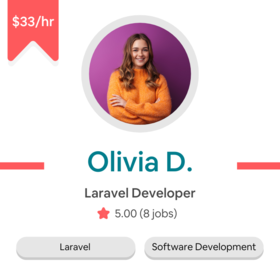













PostgreSQL is nothing short of an “all-in-one” database management system suitable for webs and apps of all sizes, from a relatively simple program to enterprise-level software. It works just as well on a single machine as it does on data centers. Cad Crowd staffing agency is well-connected with a network of professional developers, giving you access to experienced PostgreSQL developers from all across the country. Our custom staffing solution is designed to be flexible enough to cater to every client’s specific hiring needs.
First created in 1986, PostgreSQL (formerly POSTGRES) was initially intended merely as a follow-up to its predecessor known as INGRES. Years of development later, PostgreSQL has become one of the most recognizable relational database management systems in the industry. It’s now maintained by the PostgreSQL Global Development Group and still actively developed by a worldwide team of contributors. Moreover, PostgreSQL remains free and open-source.
PostgreSQL is mainly a relational database system and takes pride in its compliance with standard SQL implementation to conform with ANSI-SQL. Because the latest standard (ANSI-SQL:2013) adds support for JSON data type, which is the most popular format for non-relational databases, PostgreSQL also maintains its compliance to an extent. However, this only means it supports no more than a handful of features typically found in NoSQL databases.
It’s supported on nearly every operating system you can find today, including Windows (XP or newer), macOS (since OS X), and all recent distributions of Linux. Some older versions of PostgreSQL also work on OpenBSD, FreeBSD, and NetBSD as well. Although there are actually no official versions available for Solaris, HP-UC, and AIX, chances are you can find some unofficial releases that work on those environments as well.
PostgreSQL should also work in the following architectures and operating systems:
PostgreSQL database administration can be done on the front or back end. Various open-source GUI, command-line, and web-based tools, such as the pgAdmin package, psql, and Adminer, can do the job. Developers can even use LibreOffice Base (or OpenOffice Base, for that matter) as a front-end control of PostgreSQL.
A few notable PostgreSQL use cases include Microsoft's Release Quality View to track Windows updates on more than 800 million devices, the International Space Station to collect telemetry data, the NOAA to build localized forecasts, Yandex Mail Service, and OpenAI as a primary API.
The range of performance optimizations and customizations available from PostgreSQL is uncommon in the world of open-source database systems. While it's not surprising to see robust and dependable systems from the likes of SQL Server and Oracle (both are commercial, proprietary technologies), having the same level of sophistication from a free alternative is an impressive feat, to say the least. PostgreSQL comes loaded with much-welcome features and extensions to build a highly scalable and easily manageable database. PostgreSQL is arguably the most popular relational database (open-source and otherwise). And after you learn some of its major benefits, it's not hard to see why.
Thanks to its approachable and versatile design, PostgreSQL is often regarded as a "one-size-fits-all" back-end technology for small and big companies (and everything else in between) when they need to build and maintain an efficient database management system. It's also cost-effective because PostgreSQL is built as an open-source solution. Using PostgreSQL as a database solution comes with neither licensing restrictions nor the likelihood of vendor lock-in. The technology has been around for nearly 28 years and is still going strong today – a testament to its resilience, performance, and usability among numerous newer alternatives.
There are four main characteristics of a fault-tolerant database: Atomicity, Consistency, Isolation, and Durability – or ACID. PostgreSQL is ACID-compliant. Furthermore, every single entry in the database is always accurate because incomplete changes are never stored in the database to protect integrity. As part of its fault-tolerant design, you’ll be pleased to know that PostgreSQL comes with an excellent recovery function to restore databases to any specific point. PostgreSQL is equipped with an automatic write-ahead logging feature, which keeps a log of every single change to the database. Its write-ahead logging runs all the time, so it’s easy to reset the database system to a stable point in case something wrong happens. Most PostgreSQL services (cloud-managed) handle everything automatically. Developers can also use third-party tools to simplify the process.
Developers can extend the existing database using procedural languages to create custom functions in any given data. Such custom functions are known as stored procedures. There are two types of procedures, including safe and unsafe. The former refers to procedures written in a sandboxed environment and possibly created “safely” by any user, whereas the latter is only accessible to superusers through the bypassing of security restrictions. Unsafe stored procedures also allow access to external databases. PostgreSQL supports three procedural languages:
With extensions, it’s possible to load other languages, such as Perl and Python, into the database as well. The point is that procedural languages and extensions make PostgreSQL even more scalable than it is by default.
Certain database systems cannot handle concurrency effectively without locking out access. They need to restrict the number of users accessing the data simultaneously to avoid the possibility of read/write conflicts. PostgreSQL has a Multiversion Concurrency Control (MVCC) to manage concurrency so that there’s never going to be a read/write conflict regardless of how many users are logged into the database system. Reads will not block writes, and vice versa.
MVCC and other performance optimizations are typically available in proprietary database systems. PostgreSQL, as a free and open-source technology, is an obvious winner. An open-source database system offers clear benefits to businesses of all sizes. The cost-saving advantage allows the companies to be more flexible with their technology stack, and the fact that PostgreSQL remains actively developed by a large base of contributors makes it a safe bet to ensure scalability and compatibility for the foreseeable future.
Having a talented, professional, experienced PostgreSQL on your team opens the door to harnessing the full power of well-managed web scraping. Cad Crowd helps you handle the entire hiring process, from the very first step of drafting the job requirements to a series of thorough evaluations leading to placement. We take a step-by-step approach to conduct a complete assessment of developers' technical competence, including a detailed look at their involvement in verified past projects, to improve your chances of hiring only the right professional for the job.
Experienced PostgreSQL developers should be able to demonstrate their proficiency in the following web technologies:
Preferred additional competencies depending on the project may include:
PostgreSQL developers, regardless of the project, work almost exclusively on relational database systems and all related technologies. Their main duty is to build and manage databases. A large portion of their job involves creating such elements as scripts, queries, and procedures. In addition, they need to confirm that the codes, data quality/integrity, and database structures meet the client's needs and standards. In most web/app development projects, they will most likely collaborate with front-end developers to ensure proper communication between the client-side interface and server-side database.
As sophisticated as PostgreSQL might be, the technology is only as good as the developers using it. When it comes to database systems and management on the back-end, some argue that nothing comes close to PostgreSQL in terms of scalability, extensibility, and overall reliability. It allows you (or your app) to handle an enormous amount of data and streamline the management tasks; combine those with proper front-end development, and you get not only a high-performance application but also an aesthetically pleasing interface to boot. Considering the fact that PostgreSQL is an open-source technology backed by a large community behind it, your developers can keep on improving the app with new features and optimizing its performance to meet modern standards.
Technical skills are of the essence, but soft skills are equally important in a developer. Just because someone can code well, it doesn't always mean the person is a good team member and capable of taking suggestions and constructive criticism with a positive attitude. There's also no guarantee that a technically proficient developer can translate ideas into technical processes usable for coding. This is the main reason our recruiters put heavy emphasis on evaluating candidates' communication, problem-solving, and critical thinking skills through assessments. Our goal is to deliver technically dependable PostgreSQL developers who also demonstrate the right aptitude toward your company culture.
Reach out to Cad Crowd at your convenience and get your free quote today. We’ll give you a detailed walkthrough of our hiring process, including how or where we search for the best candidates, the types of technical assessment we have in store, and the strategies we employ to draw the attention of active and passive candidates from all around the country.
Discover how we can create customized database solutions to fit your business objectives. If you're new to Cad Crowd or unsure about the process, don't worry - our team is available to guide you every step of the way. Collaborate with professionals who prioritize your project's success. Unlock the potential of efficient database management with us.
Get a comprehensive database solution with Cad Crowd's expert PostgreSQL developers. Contact us for a free quote and learn more about how we operate. Together, let's enhance your data management capabilities.


